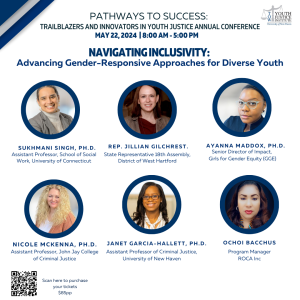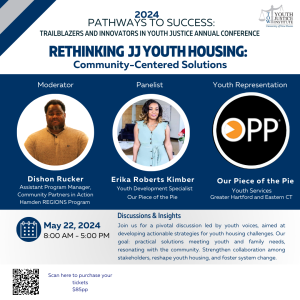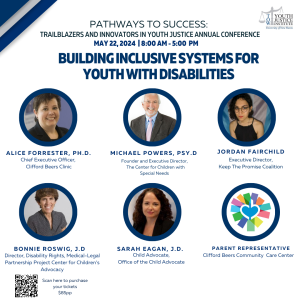Supporting Disconnected Youth in Connecticut: Current Status and Future Directions
This panel will delve into the current landscape of disconnected youth in Connecticut, exploring recent developments since the release of the latest report. Experts will discuss the various initiatives and efforts undertaken by organizations in the state to address this pressing issue. Additionally, the panel will provide insights into the data model utilized for the report, offering a brief overview, and will highlight key data findings that shed light on the challenges faced by disconnected youth in Connecticut. Looking ahead, the panel will outline strategies and plans for sustaining and furthering this important work to support and empower disconnected youth in the state.

Navigating Inclusivity: Advancing Gender-Responsive Approaches for Diverse Youth
This session will explore the integration of gender-responsive approaches for youth within the juvenile justice and behavioral health systems. Panelists will discuss strategies for integrating gender-responsive practices into policies, programs, and service delivery and the challenges to implementation. Attendees will hear about how collaborations work best to foster equity within youth systems.

Rethinking Juvenile Justice Housing: Community-Centered Solutions
Hear this crucial discussion aimed at developing concrete action plans and strategies to address challenges in a variety of youth housing settings. Our main goal is to form practical solutions that address the needs of youth and their families and resonate with the community. Additionally, we seek to strengthen collaboration among stakeholders and to rethink and reshape the landscape of youth housing and devise system change.

Building System Collaborations for Youth with Disabilities
Panelists will be talking about the unique challenges and needs of youth with disabilities within various systems in our state. Our main goal is to shed light on the specific hurdles these individuals face and how we can address them. Additionally, we aim to foster collaboration among stakeholders, promote best practices, and generate actionable recommendations for systemic improvements.

Building Bridges: Enhancing Public Safety through Innovative Police-Behavioral Health Collaborations”
We will be exploring the collaboration between police and behavioral health in the Elm City COMPASS program. During this session, we hope to show attendees the benefits of innovative collaborations between police and behavioral health professionals. The panel focuses on the collaboration between the New Haven Police Department and Elm City COMPASS working to better serve those in crisis in New Haven. Join us in exploring collaborations between public safety and behavioral health.